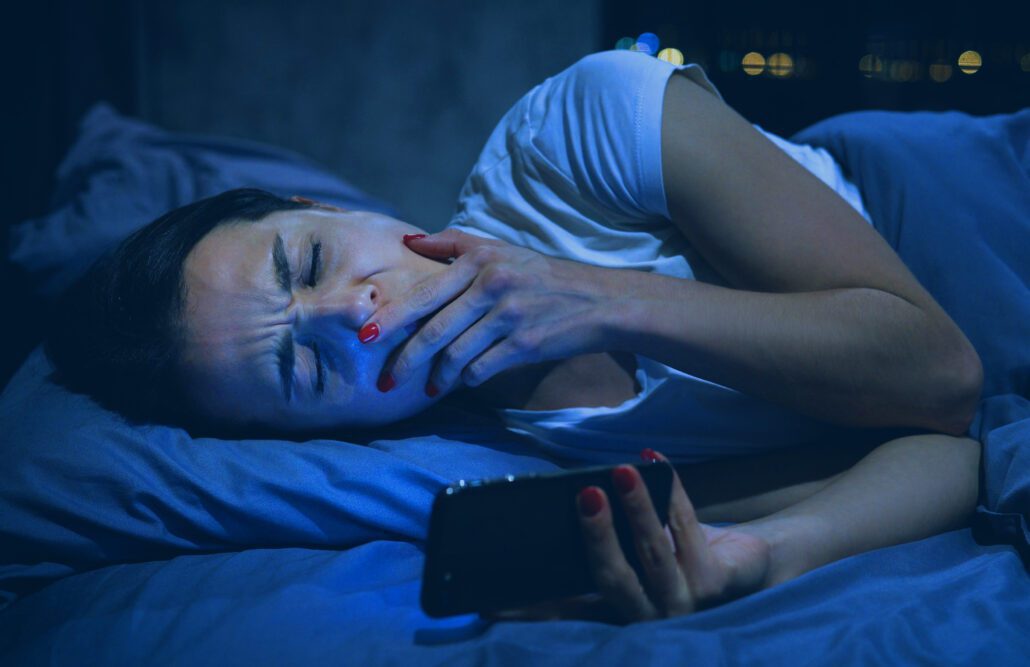How Blue Light Affects Your Sleep Quality

We’ve all been there – it’s late at night, you’re trying to go to sleep, but you can’t seem to drift off. So you check your phone one last time before putting it away, only to find that it’s now 2 am. You’ve been staring at a screen for hours, and you can’t help but think that’s why you’re still wide awake. But what precisely about blue light from screens keeps us awake?
This article explores how blue light affects your sleep quality and how long before sleep you should avoid blue light.
What is blue light?
Sleep is an essential part of our daily lives. It allows our bodies to rest and recharge and is critical for our overall health and well-being. Unfortunately, our modern lifestyles often make it difficult to get a good night’s sleep. One of the main culprits is blue light from screens, such as computers, smartphones, and tablets.
Blue light is a type of visible light shorter in wavelength than other colors. This means it has more energy and is thus brighter and more stimulating. Because of this, blue light strongly impacts our bodies and brain. For example, blue light emitted by LED and electronic devices can affect your hormone production, alertness, and sleep cycles.
Devices that emit blue light:
- LED lights
- Fluorescent lights
- Smartphones
- Televisions
- Tablets
- Computers
- E-readers
- Video game consoles
- Other forms of digital light
How does blue light affect your sleep quality?
The body’s natural sleep rhythm is governed by the circadian clock, which is sensitive to light. In the daytime, the brain is stimulated by blue light, making us more alert. At night, however, blue light suppresses the production of melatonin, the hormone that makes us feel sleepy. According to a study published in the Journal of Biological and Medical Rhythm Research, blue light disrupts the production of melatonin, which can prevent you from sleeping.
Melatonin levels should naturally rise in our bodies approximately two hours before sleep. The rise in melatonin directly contributes to the drowsiness that signals you’re ready for sleep. But if you’re exposed to blue light, melatonin production can get disrupted, making it harder to fall asleep or stay asleep. Blue light exposure can also lead to poorer quality sleep, as it can reduce the time spent in deep sleep.
How much sleep does an average adult need?
The average adult needs between 7 and 8 hours of sleep per night. However, many factors can influence how much sleep a person needs, including age, lifestyle, health, and stress levels. And, of course, there are always exceptions to the rule. A small percentage of people can function perfectly well on six hours of sleep daily.
How long before going to sleep should you avoid blue light?
As mentioned previously, your body starts increasing melatonin levels about two hours before sleep to help you prepare for bed. But blue light can disrupt melatonin production, which can make you feel alert even when you should be sleeping. To avoid disrupting melatonin production, you should avoid all sources of blue light at least an hour or two before sleep.
This blog provides general information and discussions about health and related subjects. The information and other content provided in this blog, website or in any linked materials are not intended and should not be considered, or used as a substitute for, medical advice, diagnosis or treatment. This blog does not constitute the practice of any medical, nursing or other professional health care advice, diagnosis or treatment. We do not diagnose conditions, provide second opinions or make specific treatment recommendations through this blog or website.
If you or any other person has a medical concern, you should consult with your health care provider or seek other professional medical treatment immediately. Never disregard professional medical advice or delay in seeking it because of something that you have read on this blog, website or in any linked materials. If you are experiencing a medical emergency, please call 911 or call for emergency medical help on the nearest telephone immediately.
